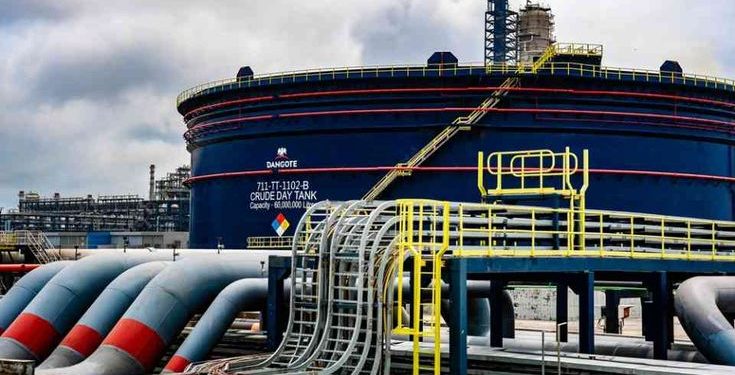Dangote Petroleum Refinery has announced the nationwide commencement of Premium Motor Spirit (PMS) and diesel distribution. Beginning August 15, 2025, the refinery will supply these products directly to a wide array of large-scale consumers, including marketers, petrol dealers, manufacturers, telecommunications firms, aviation companies, and other industrial stakeholders. This initiative is part of a broader strategy to streamline fuel logistics, reduce distribution costs, and support Nigeria’s economic recovery.
To facilitate the seamless execution of this plan, Dangote Refinery has invested in 4,000 state-of-the-art Compressed Natural Gas (CNG) powered tankers. These vehicles will be instrumental in ensuring the efficient and eco-friendly transportation of fuel across all 36 states and the Federal Capital Territory. Additionally, the company is building a network of CNG daughter booster stations, supported by another 100 CNG tankers, to create a robust and reliable supply chain.
At the core of this initiative is a promise of free logistics—a game-changer in a country where fuel distribution costs significantly impact retail pump prices. Petrol stations, especially those in underserved and rural areas, are expected to benefit from revitalised operations, while manufacturers and telecoms firms will see production and operational costs drop. The move is expected to reduce inflationary pressure, stimulate economic activity, and increase employment by reviving dormant filling stations and supporting small and medium-sized enterprises (SMEs).
The refinery’s offer also includes a generous credit facility. Buyers who purchase at least 500,000 litres of PMS or diesel will be eligible to receive an additional 500,000 litres on a two-week credit term, backed by a bank guarantee. This arrangement aims to ease the financial burden on fuel dealers and encourage bulk purchases.
In the words of Dangote Group’s management, this nationwide fuel supply scheme is more than just a business decision—it is a national development strategy. It aligns directly with President Bola Ahmed Tinubu’s “Renewed Hope Agenda” by promoting economic inclusivity, stabilising fuel supply chains, and ensuring access to affordable energy in every corner of the country. The company also acknowledged the Federal Government’s role, particularly the support offered through the Naira-for-Crude scheme, in ensuring the success of this rollout.
However, the announcement has been met with a mixed bag of reactions from industry stakeholders. The Petroleum Products Retail Outlets Owners Association of Nigeria (PETROAN) expressed concerns about potential market monopolisation. The association warned that Dangote’s direct-to-market approach could push out independent depot operators and private fuel transporters, leading to mass shutdowns of filling stations and job losses. PETROAN President, Billy Gillis-Harry, called for regulatory intervention to ensure fair competition and market sustainability.
Industry experts have also weighed in on the development. While energy lawyer Ayodele Oni hailed the initiative as a “potential game-changer” for fuel distribution and logistics, others such as Jide Pratt, COO of Tradegrid, warned of market saturation risks. Pratt cautioned that, without adequate oversight, Dangote could corner as much as 70% of the downstream sector, leading to reduced participation by smaller players and potential job displacement.
Conversely, some analysts view the development as a necessary evolution in the sector. Kelvin Emmanuel, an economist and co-founder of Dairy Hills, argued that the move addresses longstanding inefficiencies in Nigeria’s fuel supply chain, including risks from tanker strikes, pricing inconsistencies, and product adulteration. He maintained that Dangote’s entrance should be seen as filling a regulatory vacuum rather than monopolising the market.
Muda Yusuf, CEO of the Centre for the Promotion of Private Enterprise (CPPE), supported this view, noting that enhanced logistics and fuel availability would benefit rural communities the most. He further added that uniformity in pricing, driven by Dangote’s streamlined supply chain, could help tame inflation and boost investor confidence.
The 60-day registration window for marketers, which began on June 16 and runs until August 15, is already open. Prospective partners are required to undergo Know Your Customer (KYC) verification as part of the onboarding process. This thorough registration aims to ensure transparency and accountability in the fuel distribution network.
Ultimately, the Dangote Refinery initiative is a high-stakes gamble that seeks to reset the narrative around Nigeria’s downstream petroleum sector. It promises efficiency, affordability, and sustainability but also presents challenges around regulation, fair market access, and job security. As the countdown to August 15 begins, the eyes of the nation and indeed the world will be watching to see whether this bold new strategy delivers on its promise to revolutionise the way Nigerians access and consume fuel.
























































